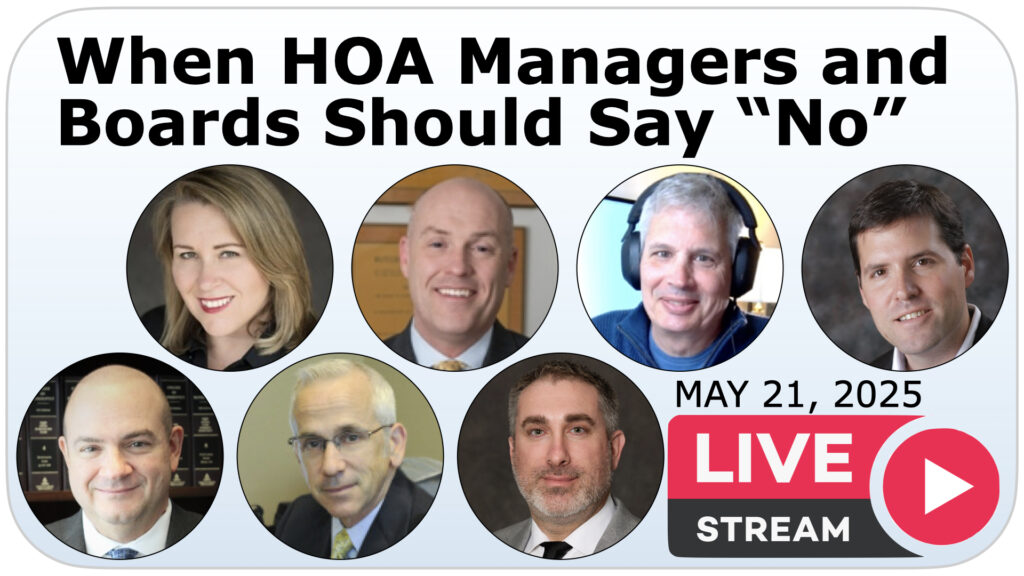In community associations, boundaries matter. Managers and board members alike are often asked to go above and beyond—but not every request should be honored. From personal…

When Managers and Boards Should Say “No”
By AssociationHelpNow®
YouTube: https://youtu.be/qDxq_Ji8fKw
GoToWebinar: https://attendee.gotowebinar.com/recording/4478001245098939822
Article PDF: https://files.constantcontact.com/8d350562101/c59035d9-b3e6-4955-a377-14870d2df038.pdf
In community associations, boundaries matter. Managers and board members alike are often asked to go above and beyond—but not every request should be honored. From personal errands to legal advice, our panel of industry experts explored exactly where to draw the line during a recent livestream titled “When Managers and Boards Should Say ‘No’.”
The conversation, guided by real-world scenarios and questions from attendees, made one thing clear: saying “no” is not only sometimes appropriate—it’s necessary to protect everyone involved.
Personal Favors: More Than Just a Kind Gesture (Starts at 7:49)
From being asked to pick up dry cleaning, retrieve mail, walk a resident’s dog, or even fetch a child from a bus stop—managers are often put in uncomfortable positions. While these may seem like neighborly gestures, they cross the line of professionalism and open the door to liability.
Panelists warned that even well-intentioned acts can backfire. Letting a resident into their unit to retrieve a forgotten item or cleaning out a refrigerator after a power outage could result in claims of theft, damage, or discrimination. The advice was clear: kindness should never come at the cost of legal exposure.
Legal Advice: A Firm “No” (Starts at 28:42)
Both board members and managers were strongly advised to avoid giving legal advice—no matter how innocent the conversation may seem. Saying “I’m not a lawyer, but…” won’t shield anyone from liability.
The rule? If it sounds like a legal matter, defer to legal counsel. Always.
Financial Decisions Without Approval (Starts at 33:27)
Managers must operate within the spending authority granted by their management contract. Even small expenditures—like buying water for the gym—can create tension if not clearly outlined in advance. Most contracts include a dollar threshold for emergency spending and require board approval for anything beyond that.
The takeaway: Know your contract. If unsure, ask.
Directing Traffic: Should You Step In? (Starts at 20:04)
When a garage gate breaks and traffic needs to be directed, should the manager step in?
This one sparked debate. Panelists noted that directing traffic is not typically within a manager’s job description and may carry liability. However, if there’s a true emergency (e.g., sinkhole), managers may have to step in. Still, best practice is to consult supervisors and document the decision.
Board Members Aren’t Exempt (Starts at 17:32)
Board members must also be careful. Helping a neighbor with their TV, letting someone in their unit, or acting on their own outside of meetings can expose the board and association to risk. Even with good intentions, board members must avoid actions that blur their role.
Confidentiality and HOA Resources (Starts at 41:42)
Sharing confidential information—especially related to legal, health, or financial issues—can damage the association. Managers and board members must protect sensitive data at all costs.
As for using HOA funds or supplies for personal gain? Just don’t. It erodes trust and could trigger legal or insurance issues.
The “In My Opinion” Myth (Starts at 37:00)
Sprinkling “in my opinion” in front of a reckless or defamatory statement doesn’t protect you from liability. It may help in some contexts, but not always. Especially when accusations are involved, words matter—and so does how you say them.
Disputes and Subpoenas (Starts at 50:32 for disputes, 52:51 for subpoenas)
Managers should not mediate disputes that have legal potential. Informally diffusing neighbor complaints is one thing—but once the word “lawsuit” is used, it’s time to step aside.
Likewise, accepting subpoenas may seem harmless, but mishandling them can result in missed deadlines and serious consequences. Best practice: let the attorney be the registered agent.
Lunch on the HOA’s Dime? (Starts at 42:53)
Should the HOA pay when a manager and board member go to lunch to discuss business?
The panel’s answer: No. Even if HOA business is discussed, it’s not a justified expense and creates bad optics. If it’s truly business-related, the management company should cover it—not the association.
Maintenance, Cleanups & Odd Requests (Starts at 50:22)
Managers and board members should never perform hazardous maintenance or cleanup tasks. From picking up after pets to removing decomposing food or handling biohazards—leave it to licensed professionals.
Same goes for bizarre requests like babysitting, pet-sitting, or “keeping an eye on someone for the police.” If it sounds odd or unsafe—it probably is.
Closing Advice (Starts at 58:32)
The session wrapped with reminders:
- Stick to your scope.
- When in doubt, consult your contract.
- Trust your instincts.
- Don’t act like a lawyer, doctor, or traffic cop if you’re not.
Saying “no” might be uncomfortable in the moment—but it’s often the most responsible, professional, and protective choice you can make.
Remember: A healthy community is built on boundaries, respect, and clear roles. Managers and board members who understand when to say “no” are the ones best positioned to help their associations thrive.
To learn more or watch additional programs, visit AssociationHelpNow.com.
Panel
Raymond Dickey
AssociationHelpNow
Brainerd Communications, Inc.
ray@brainerdcommunications.com
www.AssociationHelpNow.com
David Byrne, Esq.
Ansell Grimm & Aaron, PC
dbyrne@ansell.law
www.ansell.law
Sean O’Connor, Esq.
Clarkson McAlonis & O’Connor, P.C.
soconnor@cmolawpc.com
www.cmolawpc.com
John LaGumina, Esq.
The LaGumina Law Firm, PLLC
jlagumina@laguminalaw.com
www.laguminalaw.com
Cory Kravit, Esq.
Kovitz Shifrin Nesbit
ckravit@ksnlaw.com
www.ksnlaw.com
Dawn Becker-Durnin, CIRMS
Acrisure
dbecker-durnin@acrisure.com
www.HOAInsuranceSC.com
Gregg V. Gerelli
Gerelli Insurance Agency, Inc.
gregg@gerelli-insurance.com
www.gerelli-insurance.com
Disclaimer: This content is provided for informational purposes only and does not constitute professional advice. It has been generated using the GoToWebinar system and assisted by artificial intelligence; therefore, accuracy is not guaranteed. This summary is offered as a courtesy to highlight the significance of the discussed topic and encourage viewers to revisit the recorded livestream for full context. Always consult your legal, accounting, or other qualified professionals before making any decisions or taking action based on this content.






